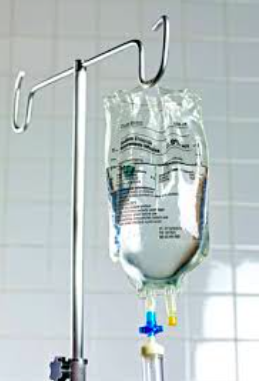"it doesn't go"
Every weekday morning at 6:30 a.m., patients who want a doctor's appointment that day line up outside the hospital gate for triage. If there are four providers in the clinic, we can see 120 patients. Some days as many as 500 patients wait in line.
The director of the hospital triages them one at a time. All pregnant women and sick children get appointments. And then the director fills the remaining appointments with the adults who have the most urgent complaints. The rest are given appointments for a future date -- right now, we're booked three months out.
If anyone gets very ill in the meantime, they can skip the clinic and go straight to the hospital (the building behind the clinic), where we have E.R. and inpatient services.
For the first two weeks I was here in Togo, I worked in the clinic, seeing as many as 35 patients a day. And they're not just Togolese. Other patients come from Ghana, Burkina Faso, Nigeria and Benin. Some of them drive here the day before and spend the night sleeping on the ground outside the hospital gate. Others wake up early and leave their homes at 2 a.m. to get here in time for triage.
Some of them have serious diagnoses, like cancer and malaria and asthma attacks.
On my first day in clinic, one of my first patients was a 60-year-old man with untreated emphysema who was wheezing and had an oxygen saturation of 84% (normal is 96-100%).
When his friends walked him into the exam room, I said, "Ca va?" (which means "How's it going?"
The man shook his head as he struggled to breathe. "Ca ne va pas," he said. ("It doesn't go.")

And he was right -- based on his lung sounds and low oxygen saturation, it wasn't going for him at all. We quickly took him to the E.R. where he got oxygen, nebulizer treatments and steroids.
Lots of other patients have chronic issues like hypertension and diabetes that have gone untreated for years because they didn't have good access to medical care.
And some patients come for simple complaints. I've had dozens of patients in their 50's and 60's whose joints are worn out from working in the fields all their lives, and they come for a Tylenol prescription so they can get some pain relief. There are drug stores here who sell Tylenol over the counter, but there isn't good drug regulation, so often the products end up being fake, and they don't work.
I'm humbled as I sit with patients who woke up at 2 a.m. to drive here, then waited in line for hours, only to get 10 minutes of my time and 50 tablets of real Tylenol.
When I leave clinic in the evenings, I return to my room and sit with the tangle of emotions I'm feeling.
I feel sad that people have been suffering for so long. I feel angry that they can't get simple relief from over-the-counter medications like ibuprofen and aspirin and Tylenol. I feel humbled that I can offer diagnoses and prescriptions that improve their quality of life. And I feel thankful that I get to show compassion in such a tangible way.
Most nights, I go to bed around 9 p.m. because I'm so exhausted.
And then I wake up in the morning, take a deep breath, walk back to the clinic, and do it all again.
